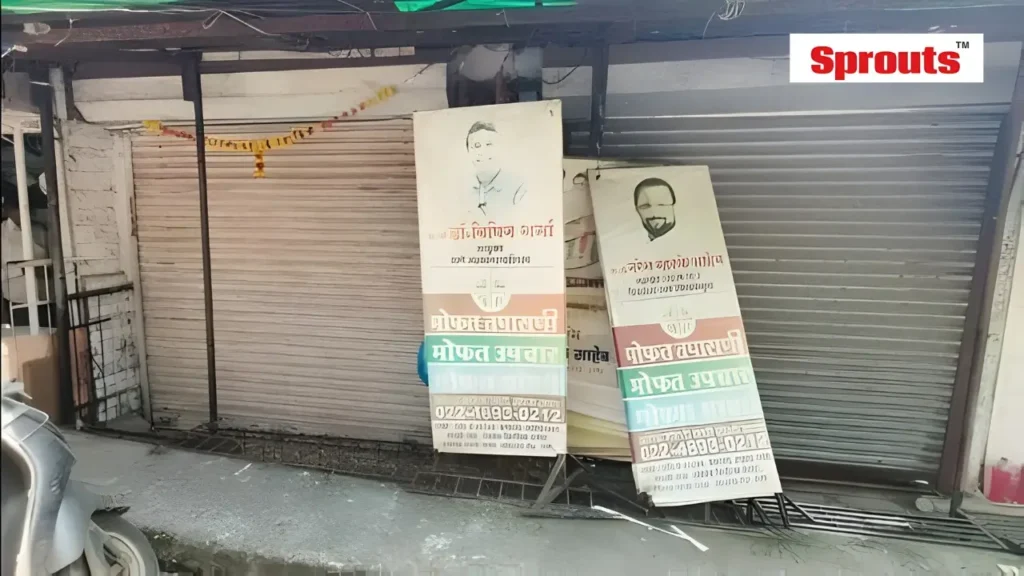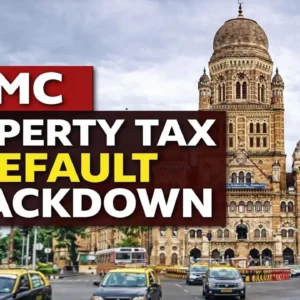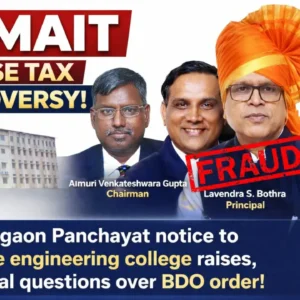Aapla Dawakhana Scheme Fails: Thane Clinic Replaced by Sari Shop
• From Clinic to Sari Shop: A Symbol of Failed Promises
• Financial Mismanagement: Unpaid Rent and Contractor Dues
• Impact on Thane’s Poor: Healthcare Access Denied
The Aapla Dawakhana scheme — launched to offer affordable healthcare to urban poor in Thane — has collapsed amid financial mismanagement and unpaid rents. A Sprouts News investigation found one government clinic now converted into a sari shop, symbolising the initiative’s failure. Despite promises by Deputy CM Eknath Shinde, the project remains stalled, leaving thousands without essential healthcare access in one of Maharashtra’s most densely populated cities.
- Aapla Dawakhana Scheme Fails: Thane Clinic Replaced by Sari Shop
- • From Clinic to Sari Shop: A Symbol of Failed Promises
- • Financial Mismanagement: Unpaid Rent and Contractor Dues
- • Impact on Thane’s Poor: Healthcare Access Denied
- Aapla Dawakhana Scheme Collapses: Thane’s ‘Sari Shop’ Clinic Exposes Healthcare Failure
- From Clinic to Cloth Shop: A Symbolic Failure
- Systemic Breakdown and Financial Questions
- Human Cost: Unpaid Staff and Betrayed Citizens
Click Here To Download the News Attachment
Aapla Dawakhana Scheme Collapses: Thane’s ‘Sari Shop’ Clinic Exposes Healthcare Failure
The ambitious ‘Aapla Dawakhana’ scheme in Thane has suffered a major collapse. Intended to provide primary healthcare to the city’s urban poor, the project now lies in ruins. A Sprouts News investigation uncovers a shocking reality on the ground. One clinic has been replaced by a sari shop, symbolising the initiative’s failure.
This raises serious questions about the scheme’s management and oversight. The Maharashtra government allocated significant funds for this project. Deputy Chief Minister Eknath Shinde had championed it during his tenure as Thane’s guardian minister. Our investigation reveals a deep disconnect between political promises and practical implementation.
From Clinic to Cloth Shop: A Symbolic Failure
A banner from a grand inauguration now gathers dust near the former clinic. It features photos of MP Naresh Maske and former Commissioner Bipin Sharma. This visual starkly contrasts with the current sari shop operating from the same premises. The transformation from a healthcare centre to a commercial outlet is undeniable.
The building owner confirmed the clinic’s closure due to unpaid rent. A two-year lease agreement was signed with the operating contractor. The first year’s payments were made regularly by the involved authorities. However, payments stopped entirely during the second year of the operation. Mounting dues ultimately forced the owner to terminate the contract and find a new tenant.
This failure directly impacts Thane’s most vulnerable residents. Over 52% of the city’s population lives in slums and cramped chawls. They relied on these clinics for accessible and free primary medical treatment. The closure leaves them with fewer options, increasing pressure on overcrowded public health centres.
Also Read: HC Orders Thane to Reclaim Land from Pratap Sarnaik Firm.
Systemic Breakdown and Financial Questions
The ‘Aapla Dawakhana’ scheme was a well-funded government initiative. The state government approved a massive budget of ₹210 crore for its rollout. Each clinic was equipped to offer 30 types of diagnostic tests to patients. They also stocked 105 varieties of medicines and 66 types of medical equipment.
The Thane Municipal Corporation planned to open approximately 50 such clinics. These centres aimed to decongest the existing 27 overburdened civic health centres. Currently, each public health centre serves a massive population of 1 to 1.5 lakh people. This far exceeds the standard norm of one centre per 30-40 thousand people.
The contract for running these clinics was given to ‘Medongos Aapla Dawakhana’. The organisation was to receive ₹150 per patient from the municipal corporation. This public-private partnership model was designed for efficient service delivery. However, the model has clearly failed in its execution and financial sustainability.
Human Cost: Unpaid Staff and Betrayed Citizens
The collapse has left the scheme’s employees in a dire financial state. Nurses and staff working at these clinics have not received their salaries. Many report being unpaid for periods exceeding six consecutive months. They have submitted formal complaints to the municipal corporation regarding these dues.
This non-payment of wages points to a severe administrative failure. It suggests a breakdown in the fund flow from the authorities to the contractor. The dedicated healthcare workers are now unemployed and struggling financially. Their plight underscores the human cost of the scheme’s mismanagement.
The ultimate betrayal, however, is of the common citizen. The ‘Hindu Hrudaysamrat Balasaheb Thakare Aapla Dawakhana’ was a promise of dignity. It promised free, quality healthcare at the doorstep for the economically weak. The sight of a sari shop in its place is a stark reminder of that broken promise.
The Sprouts News Special Investigation Team finds a clear need for accountability. The Thane Municipal Corporation must explain the fund utilization and contractor oversight. The state government must audit the scheme’s implementation across all designated locations. The public deserves a transparent inquiry into this failure of public health policy.



















